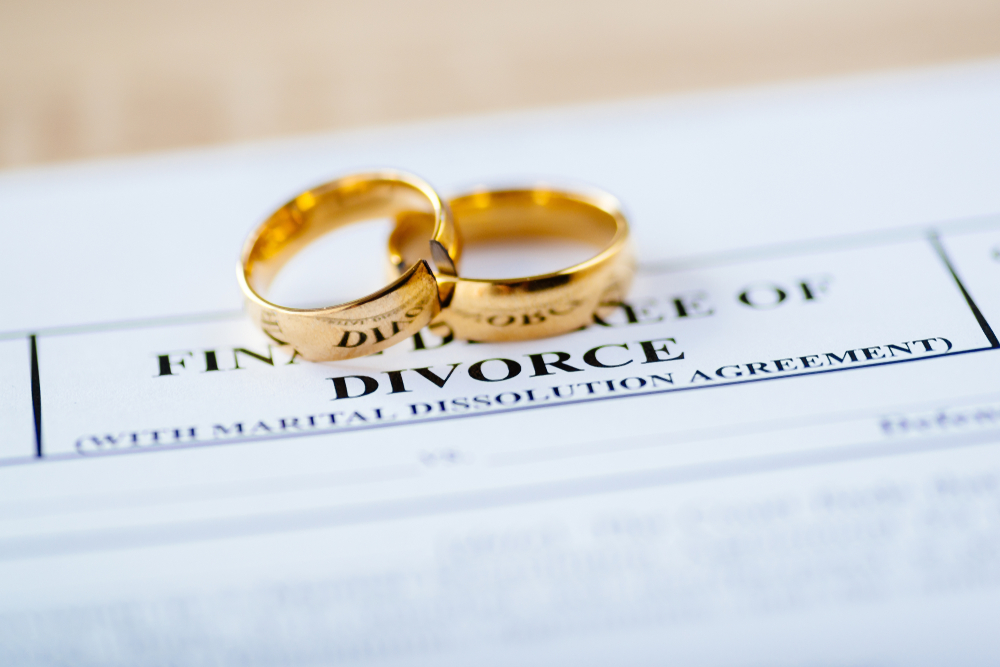
Can I Oppose a Divorce?
It’s one of the most painful questions a person can face: Can I stop my marriage from ending? In the United States, nearly 674,000 divorces were filed in a recent alone, and about 45 percent of first marriages eventually end this way. So, if you’re facing divorce and you’re not the one who wanted it, you’re far from alone.
When your spouse files for divorce and you’re not ready—or simply don’t want the marriage to end—it’s easy to feel like everything is slipping out of your hands.
But here’s the truth: while you might be unable to stop the divorce entirely, you still have power. You have rights. And you absolutely have a voice in what happens next. A Maryland divorce mediation attorney can help you understand where you stand and how to protect what matters most—your family, your future, and your dignity.
SCHEDULE A FREE CASE EVALUATION
Can You Legally Stop a Divorce from Happening?
In most cases, you can’t. Once one spouse files for divorce, the court will usually allow it to move forward, even if the other person disagrees.
That’s because most states follow some version of “no-fault” divorce. This means either spouse can end the marriage without proving wrongdoing. If the court finds the marriage is “irretrievably broken,” it must grant the divorce.
Emotionally, you may not be ready. Legally, though, there’s often no way to stop it. Still, you’re not powerless. You have every right to respond, to be heard, and to fight for what matters—your home, your children, your financial security. A divorce attorney can protect those things and ensure your voice is part of the process.
Understanding No-Fault Divorce and Why It Matters

No-fault divorce laws changed the game. They were designed to reduce the emotional and financial damage caused by assigning blame in divorce proceedings. But they also made it harder for one spouse to block a divorce just by disagreeing with it.
In a no-fault system, courts don’t need evidence of adultery, cruelty, or abandonment. All they need is one spouse saying the marriage isn’t working anymore.
This is why working with a divorce attorney is so important. Even if you can’t “win” by stopping the divorce, you can protect your parental rights, your property, and your financial future. A skilled lawyer will help shift the focus from Can I stop this? to How can I come through this in the best position possible?
What Happens If You Don’t Respond to Divorce Papers?
Ignoring divorce papers might feel like a way to resist, but it usually backfires. If you don’t respond within the court’s deadline (often 20 to 30 days), the process doesn’t pause—it speeds up without you. This is known as a default judgment.
Here’s what that can mean:
- Your spouse can get everything they asked for, including custody, money, and property.
- You won’t get to share your side of the story.
- It’s very hard to undo later and can be stressful to fight.
That’s why it’s so important to act quickly, even if you’re unsure. Even if it hurts. A divorce attorney can help you respond the right way, protect your rights, and keep the process from becoming even more one-sided than it already feels.
Do You Have a Say in the Terms of the Divorce?
Yes. Absolutely.
Even if you can’t stop the divorce, you still get a voice in what it looks like. You have the right to negotiate key issues like:
- Property Division: Who keeps the home, vehicles, savings, and other shared assets.
- Child Custody and Visitation: How parenting time is shared and who makes important decisions for the children.
- Spousal and Child Support: Whether financial support is appropriate, how much, and for how long.
A skilled divorce lawyer can help protect your interests in all of these areas. They’ll guide you through state laws, gather important documents, prepare for mediation or trial, and push back when your spouse’s terms don’t feel fair.
Don’t assume you’re stuck with whatever your spouse wants. With the right legal help, you can stand up for what matters to you.
Emotional Reasons People Want to Oppose Divorce

There’s no legal form for heartbreak. No checkbox for I’m still in love with them. But that doesn’t make your feelings any less real—or less important.
Many people oppose divorce for deeply personal reasons. Maybe you thought things were improving. Maybe you still believe in the marriage. Or maybe you’re terrified of losing your family, your routine, or your future.
These feelings matter. And they’re valid. But the law doesn’t always align with emotions. A divorce lawyer can be your lifeline here—not just legally, but emotionally. They help you focus your energy on what you can control rather than what you wish you could undo.
Grounds for Opposing a Divorce in Fault-Based States
While most states follow no-fault divorce laws, some still allow one spouse to file based on misconduct like adultery, cruelty, or abandonment.
If your spouse makes false claims, you can challenge them. For example:
- Disputing the accusations with clear evidence
- Providing witness testimony or documentation
- Working with a lawyer to build a strong legal response
Challenging fault-based claims may not stop the divorce, but it can influence custody, property, or support outcomes. Don’t try to handle this alone—having the right legal support matters.
Can Mediation or Counseling Delay or Prevent Divorce?
Sometimes, yes. Depending on where you live, a judge may recommend or require mediation or counseling—especially when children are involved. In other cases, couples choose to try therapy voluntarily.
Mediation can be a productive space to talk things out, settle disputes, or even explore reconciliation. But it’s not a cure-all. If one spouse is firmly committed to ending the marriage, counseling likely won’t change that.
Still, it’s worth asking your attorney whether these options are available. Not because they guarantee a saved marriage—but because they can provide a chance for clarity, closure, and even compromise.
What a Divorce Attorney Can Do to Support You in Court
This might not be the fight you wanted. But that doesn’t mean you have to go silent.
A divorce lawyer gives you more than legal paperwork—they give you power. They help you understand what’s happening, identify your priorities, and make smart decisions that protect your future.
You don’t have to roll over just because the divorce is moving forward. A strong legal advocate will ensure your voice is heard in every negotiation and court appearance.
You Deserve Better Than an Unfair Divorce

If your spouse is demanding full child custody, trying to take what’s yours, or offering a settlement that feels one-sided, you don’t have to accept it. Fairness isn’t automatic—it has to be fought for.
A divorce attorney can challenge unfair terms, protect your rights, and make sure your voice is heard. Even if you can’t stop the divorce, you still have power in how it plays out.
If you’re feeling overwhelmed or unsure about what to do next, talk to a lawyer. This may feel like the end—but with the right support, it can be the start of something better. And you don’t have to face it alone.
SCHEDULE A FREE CASE EVALUATION
